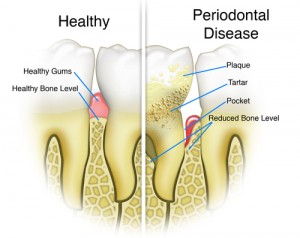 If you’re diabetic, beware of gum disease! This harmful condition affects 80% of Americans, and you may not know you have it. Gum disease, clinically known as periodontal disease, is a bacterial infection of the mouth. In the early stage, symptoms may not exist. However, mild to significant redness, swelling, tenderness, and bleeding of the gums may indicate the presence of gum disease.
If you’re diabetic, beware of gum disease! This harmful condition affects 80% of Americans, and you may not know you have it. Gum disease, clinically known as periodontal disease, is a bacterial infection of the mouth. In the early stage, symptoms may not exist. However, mild to significant redness, swelling, tenderness, and bleeding of the gums may indicate the presence of gum disease.
Checkups are extremely important in the fight against gum disease because plaque, and hardened plaque called tartar are the primary causes of the condition. However, diabetics are more prone than others to develop periodontal disease – and resulting complications.
According to perio.org, the website for the American Academy of Periodontology, “Severe periodontal disease can increase blood sugar, contributing to increased periods of time when the body functions with a high blood sugar. This puts diabetics at increased risk for diabetic complications. Thus, diabetics who have periodontal disease should be treated to eliminate the periodontal infection.”
The best way to determine if you suffer from gum disease is to see your dentist or hygienist. By evaluating your teeth and gums, and measuring periodontal pockets at the gum line, an oral health professional can diagnose the disease. If you have gum disease, treatment may involve scaling and root planing, called a deep cleaning. With scaling, a hygienist removes tartar from below the gum line. During root planing, rough areas on teeth roots are smoothed to reduce the risk for plaque buildup. Other treatments involve topical antibiotics, laser dentistry, and, in severe cases, surgery. The longer you wait to address periodontal disease, the worse the damage will become. On the flip side, treating gum disease in the earliest stage can save time, money, and healthy oral tissues.
Don’t ignore bleeding gums, especially if you’re diabetic! Call (641) 628-1121 to schedule a hygiene appointment or checkup with Dr. Allen and our team. We are located on the west side of the historic town square in Pella. Please see the map below for directions.



